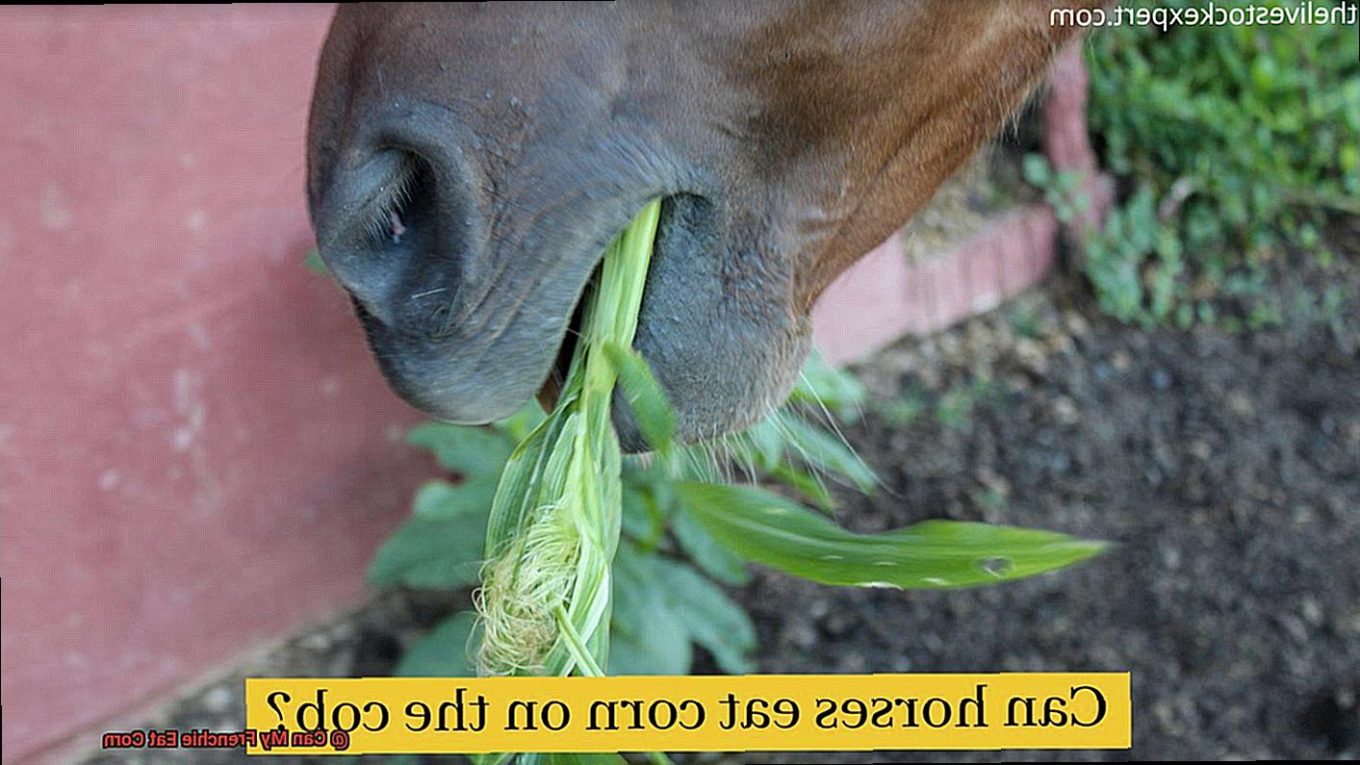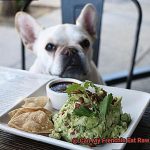Can My Frenchie Eat Corn?
French Bulldogs, those adorable little bat-eared bundles of joy, have captured the hearts of dog lovers everywhere. As devoted owners, we’re constantly on the lookout for ways to keep our furry friends happy and healthy.
And when it comes to food, the question of whether corn is safe for our Frenchies has sparked quite a debate in the pet community.
Corn, a versatile staple in many human diets, has left pet owners divided. Some claim their pups gobble it up without issue, while others worry about its impact on their dogs’ well-being. So let’s dive into the nutritional benefits and potential risks of feeding corn to your Frenchie.
Can my Frenchie eat corn?
Contents
- 1 Can my Frenchie eat corn?
- 2 Nutritional Value of Corn for French Bulldogs
- 3 Potential Health Risks of Feeding Corn to French Bulldogs
- 4 How Much Corn Can My Frenchie Safely Eat?
- 5 Tips for Introducing Corn into Your Frenchie’s Diet
- 6 Symptoms of Digestive Upset or Allergies in French Bulldogs After Eating Corn
- 7 What to Do if Your Frenchie Experiences Adverse Reactions to Eating Corn
- 8 Alternatives to Feeding Your Frenchie Corn
- 9 Conclusion
Health Benefits of Corn for French Bulldogs:
We all know that corn is chock-full of nutrients that benefit humans, but what about our four-legged companions? For French Bulldogs, corn can actually offer some health perks when given in moderation.
Packed with essential vitamins like folate and vitamin C, as well as minerals such as magnesium, corn can give your Frenchie’s immune system a boost and support their overall well-being. Plus, its dietary fiber content aids digestion and promotes regular bowel movements – always a good thing.
Risks and Considerations:
While corn can be a tasty addition to your Frenchie’s diet, there are a few things to keep in mind. First off, those little kernels can pose a choking hazard for small breeds like French Bulldogs who tend to gulp down their food. To avoid any mishaps, make sure you remove the kernels from the cob before sharing them with your pup.
It’s also worth noting that some Frenchies may be sensitive or even allergic to corn. Just like us humans, every dog is unique and may react differently to certain foods. If you notice any signs of discomfort – itching, tummy troubles or changes in behavior – after your Frenchie eats corn, it’s best to consult your vet.
So, can French Bulldogs eat corn? The answer is yes – with a few precautions. Corn can be a nutritious and tasty addition to your Frenchie’s diet, but it’s important to remove the kernels from the cob to avoid choking hazards. And always keep an eye out for any signs of sensitivity or allergies.
Nutritional Value of Corn for French Bulldogs
French Bulldogs are beloved companions known for their adorable appearance and lively personalities. As responsible pet owners, we strive to provide them with a balanced and nutritious diet. One common question that arises is whether corn is a suitable food option for our furry friends. In this article, we will explore the nutritional value of corn for French Bulldogs, highlighting its benefits and important considerations to keep in mind.
The Benefits of Corn for French Bulldogs:
Complex Carbohydrates:
Corn is a grain that is rich in complex carbohydrates, providing a valuable source of energy for our active French Bulldogs. These carbohydrates are essential for fueling their daily activities, from playing fetch to going on long walks.
Dietary Fiber:
Another advantage of corn is its high dietary fiber content. Fiber aids in digestion and helps regulate bowel movements in French Bulldogs, promoting a healthy gastrointestinal system. It can also prevent constipation and reduce the risk of certain digestive disorders.
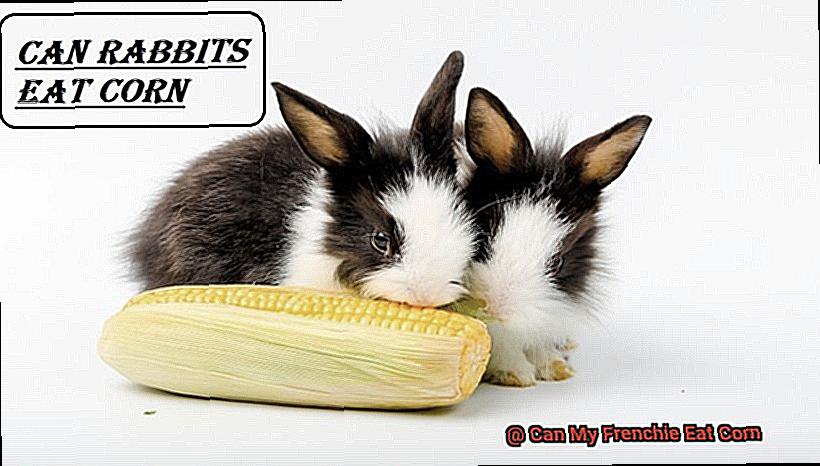
Essential Vitamins:
Corn is packed with essential vitamins that support overall health and well-being in French Bulldogs. Vitamin C boosts the immune system, while vitamin B6 plays a vital role in brain development and function.
Beneficial Minerals:
Corn contains minerals like magnesium and phosphorus, which are crucial for maintaining healthy bones and teeth in French Bulldogs. These minerals contribute to their overall skeletal structure and strength.
Eye Health:
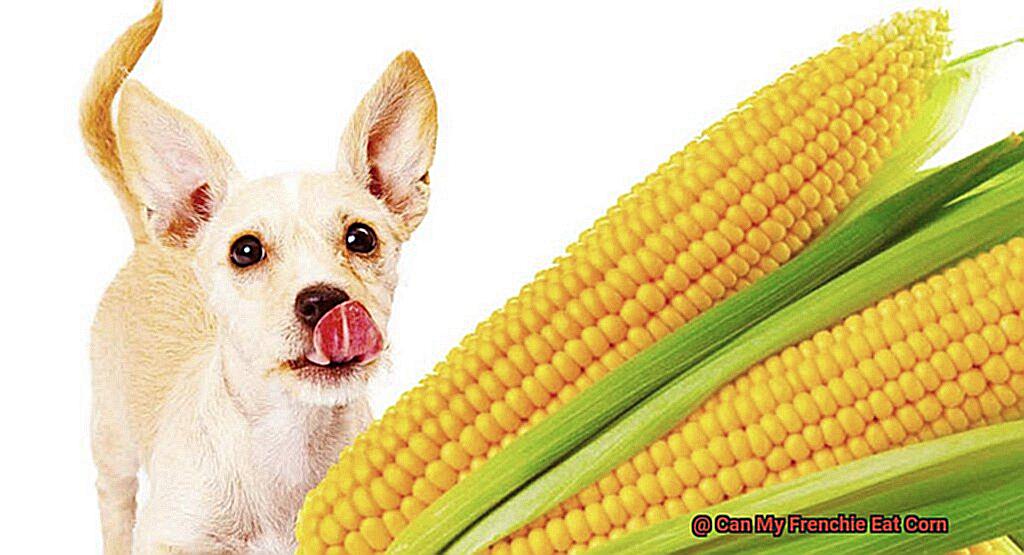
Corn contains antioxidants such as lutein and zeaxanthin, which are beneficial for eye health in French Bulldogs. These antioxidants can help prevent certain eye conditions and promote good vision.
Considerations When Feeding Corn to French Bulldogs:
Moderation is Key:
While corn can offer nutritional benefits, it should be given in moderation. Excessive consumption of corn can lead to weight gain and obesity in French Bulldogs, which can contribute to various health issues.
Allergies and Sensitivities:
It is important to observe any adverse reactions after feeding corn to your French Bulldog. Some dogs may have allergies or sensitivities to corn, resulting in digestive upset, skin irritations, or other allergic reactions. If you notice any negative effects, it is best to avoid feeding corn to your pet.
Consult a Veterinarian:
Before introducing corn or any new food into your French Bulldog’s diet, it is always wise to consult with a veterinarian. They can provide personalized guidance based on your dog’s specific needs and health conditions.
Potential Health Risks of Feeding Corn to French Bulldogs
French Bulldogs are beloved companions known for their charming personalities and unique physical features. As responsible pet owners, it is essential to provide them with a balanced and nutritious diet that meets their specific needs. While corn is a common ingredient in many dog foods, it may not be the best choice for French Bulldogs due to their predisposition to certain health issues. In this blog post, we will explore the potential health risks associated with feeding corn to French Bulldogs, providing you with valuable insights to make informed decisions about their diet.
High Carbohydrate Content and Obesity Risk:
French Bulldogs have a tendency to gain weight easily, making them susceptible to obesity. Corn is high in carbohydrates, which can contribute to weight gain if not consumed in moderation. Obesity in French Bulldogs can lead to various health complications, including joint problems, heart disease, and decreased overall quality of life.
Allergies and Sensitivities:
Food allergies are relatively common in French Bulldogs, and corn is a known allergen for dogs. Consumption of corn can trigger allergic reactions such as itching, skin rashes, gastrointestinal issues, and respiratory problems. If you notice any signs of an allergic reaction after feeding your Frenchie corn, it is crucial to consult with a veterinarian for proper diagnosis and guidance.
Limited Nutritional Value:
Corn lacks the essential nutrients that French Bulldogs require for optimal health. While it can provide energy, it falls short in terms of vitamins, minerals, and proteins compared to other ingredients. Feeding your Frenchie a diet primarily composed of corn may result in nutritional deficiencies and compromised well-being.
GMO Concerns:
Corn is often genetically modified (GMO), which can potentially pose health risks for your Frenchie. Although the long-term effects of GMOs on dogs are still being studied, evidence suggests that they can negatively impact digestive health and overall well-being. Opting for corn-free dog foods and treats made with natural, high-quality ingredients can help mitigate these risks.
Digestive Issues:
French Bulldogs are known for their sensitive stomachs, and corn can be difficult for them to digest. Corn contains a protein called zein, which is challenging for dogs to break down effectively. This can lead to digestive discomfort, bloating, gas, and even more serious conditions like pancreatitis.
How Much Corn Can My Frenchie Safely Eat?
French Bulldogs are known for their sensitive digestive systems, and corn is a food that can cause issues for them. While some experts believe that corn is safe in moderation, others caution against feeding it to dogs altogether. So, how much corn can your Frenchie safely eat? Let’s dive into the details.
Corn Allergies and Sensitivities
One of the main concerns with feeding corn to French Bulldogs is that it is a common allergen for dogs. Many Frenchies are prone to allergies, and corn is one of the top allergenic ingredients in dog food. If your Frenchie has a known corn allergy or sensitivity, it is best to avoid feeding them any amount of corn. Even small amounts can trigger an allergic reaction, which may manifest as skin itching, rashes, or digestive upset.
Moderation is Key
For French Bulldogs without corn allergies, it is still recommended to limit their intake of corn. A small amount occasionally as a treat or ingredient in their regular food may be acceptable, but it should not make up a significant portion of their diet. The high carbohydrate content of corn can contribute to weight gain and obesity in French Bulldogs, who are already prone to weight issues due to their low activity levels and tendency to overeat.
Safe Preparation and Alternatives
When feeding corn to your Frenchie, it is crucial to ensure that it is cooked thoroughly and served in a safe manner. Raw or undercooked corn kernels can pose a choking hazard or lead to digestive blockages. Additionally, opt for fresh, organic corn instead of processed products like canned corn, which often contain added salt and preservatives that can be harmful to your Frenchie’s health.

Consult with Your Veterinarian
As with any dietary change or introduction of new foods, it is always recommended to consult with your veterinarian before including corn in your Frenchie’s diet. They can provide personalized advice based on your dog’s specific needs and health conditions.
Tips for Introducing Corn into Your Frenchie’s Diet
If you’re thinking about adding corn to your French bulldog’s diet, it’s important to do so carefully. While corn is not inherently harmful to Frenchies, it should be introduced gradually and in moderation. In this article, we will explore some tips to help you safely introduce corn to your Frenchie’s diet.
Start Slowly and Observe:
When introducing any new food to your Frenchie, it’s crucial to start slowly. Begin by incorporating small amounts of cooked corn into their regular meals. Keep a close eye on your pup for any adverse reactions such as diarrhea, vomiting, or changes in behavior. If your Frenchie tolerates the corn well, you can gradually increase the amount over time.
Cook Thoroughly:
To make corn easier for your Frenchie to digest, it’s best to cook it thoroughly before feeding. Boiling or steaming the corn is a great option as it softens the kernels and enhances digestibility while retaining its nutrients.
Moderation is Key:
Corn should never replace a balanced and nutritious diet for your Frenchie. It should be served in moderation as an occasional treat or small addition to their regular meals. Dogs require a variety of nutrients, so it’s important not to rely solely on corn for their nutritional needs.
Consult with Your Vet:
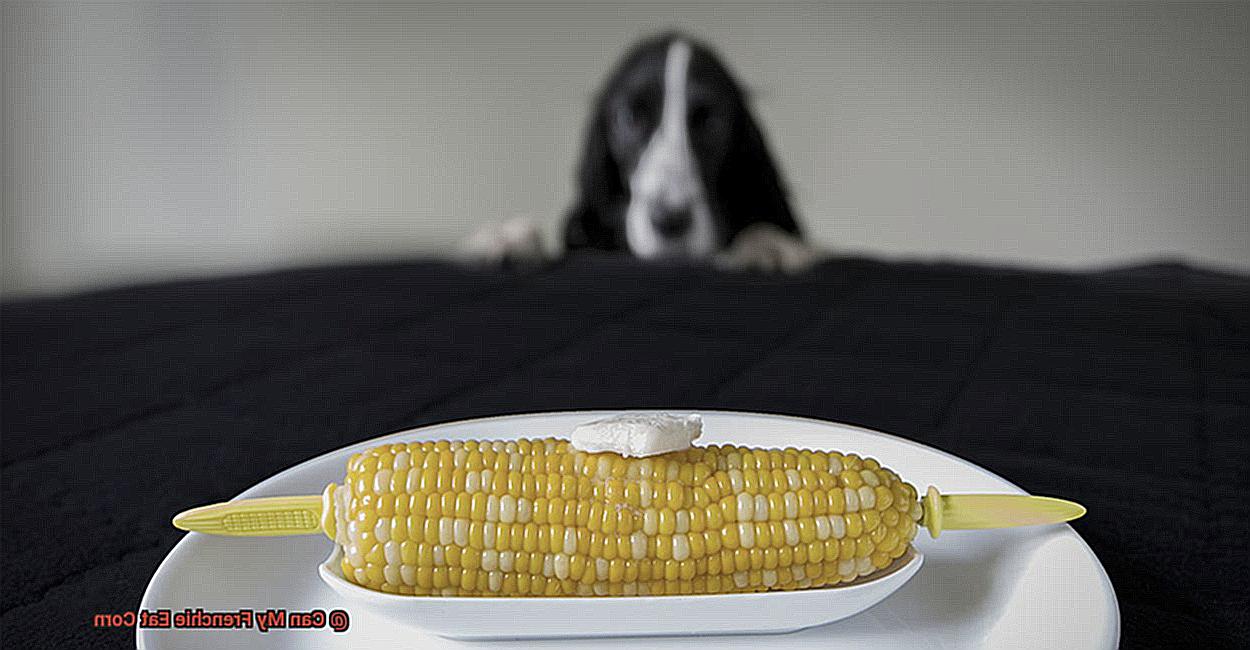
Before making any significant changes to your Frenchie’s diet, especially if they have specific dietary requirements or health conditions, consult with your veterinarian. They can provide personalized advice based on your dog’s needs and help you determine if introducing corn is suitable for them.
Watch for Allergies and Digestive Issues:
Some dogs may have difficulty digesting corn or may develop allergies to it. Watch out for any signs of digestive upset or allergic reactions after feeding corn to your Frenchie. If you notice any symptoms such as gas, bloating, or loose stools, it may be best to limit or eliminate corn from their diet.
Symptoms of Digestive Upset or Allergies in French Bulldogs After Eating Corn
French Bulldogs are known for their sensitive digestive systems, and corn can be a common trigger for digestive upset or allergies in these adorable pups. As a French Bulldog owner, it’s important to be aware of the symptoms that may indicate your furry friend is experiencing discomfort after consuming corn. Here are some signs to watch out for:
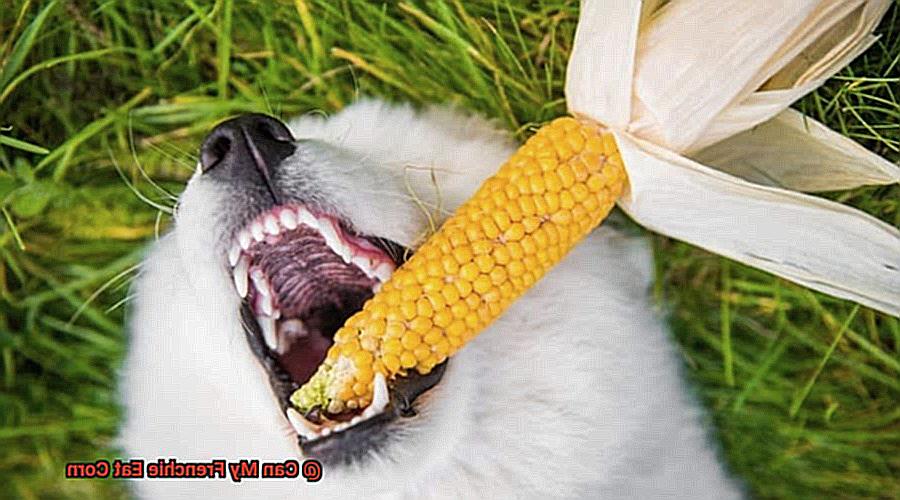
Digestive Upset:
- Diarrhea: If your French Bulldog experiences loose stools or an increase in bowel movements after consuming corn, it may be a sign of digestive upset.
- Vomiting: Excessive vomiting or regurgitation can occur when the digestive system is having trouble processing corn.
- Gas and Bloating: If you notice your Frenchie displaying signs of discomfort such as excessive gas or a distended abdomen, it could be a result of corn intolerance.
- Stomach Pain: French Bulldogs may exhibit signs of abdominal pain, such as restlessness, pacing, or whining, after consuming corn.
Allergic Reactions:
- Skin Irritations: Allergies to corn can cause skin problems in French Bulldogs, including itching, redness, rashes, hives, or even skin infections.
- Respiratory Symptoms: In some cases, allergies to corn can affect the respiratory system, leading to sneezing, coughing, wheezing, or difficulty breathing.
If you suspect that your French Bulldog is experiencing digestive upset or allergies after eating corn, it’s crucial to consult with a veterinarian. They can conduct tests to determine if your Frenchie has a corn allergy and recommend appropriate treatment options.
In the case of a confirmed corn allergy, the best course of action is to eliminate corn from your French Bulldog’s diet entirely. This means avoiding not only plain corn but also any dog food or treats that contain corn ingredients. Reading ingredient labels carefully is essential to ensure you’re not inadvertently exposing your Frenchie to corn.
When planning a diet for your French Bulldog with a corn allergy, it’s important to consult with a veterinarian or a canine nutritionist. They can help you develop a balanced and nutritious diet that excludes corn while providing alternative sources of carbohydrates and fiber.
What to Do if Your Frenchie Experiences Adverse Reactions to Eating Corn
French Bulldogs are adorable and lovable companions, but their sensitive stomachs can sometimes cause them discomfort. If your Frenchie experiences adverse reactions after eating corn, it is important to take action to ensure their health and well-being. In this article, we will discuss what to do if your Frenchie has adverse reactions to corn and provide helpful tips and insights based on both research and personal experience.
Recognize the Symptoms:
When your Frenchie experiences adverse reactions after eating corn, they may exhibit symptoms such as diarrhea, vomiting, or stomach discomfort. These symptoms can indicate an intolerance or sensitivity to corn.
Consult with Your Veterinarian:
The first step is to consult with your veterinarian. They can help determine if corn is the specific cause of the adverse reactions or if there could be an underlying health condition or allergy at play. It is important to seek professional guidance to ensure accurate diagnosis and appropriate treatment.
Eliminate Corn from Their Diet:
While awaiting veterinary advice, it is crucial to stop feeding your Frenchie any food that contains corn or corn ingredients. This includes both commercial dog food and treats. Read labels carefully and opt for alternative grain-free options or limited ingredient diets that do not contain corn.
Soothe Their Stomach:
To relieve any gastrointestinal discomfort, try feeding your Frenchie a bland diet consisting of easily digestible foods such as boiled chicken and rice. This can help soothe their stomach and give their digestive system a break. Monitor them closely during this time and ensure they stay hydrated by providing fresh water at all times.
Seek Veterinary Attention if Needed:
If the adverse reactions persist or worsen, it is crucial to seek veterinary attention promptly. Your veterinarian may recommend further testing or prescribe medication to alleviate the symptoms. Avoid self-medicating your Frenchie without professional guidance, as over-the-counter medications may not be safe or appropriate for dogs.
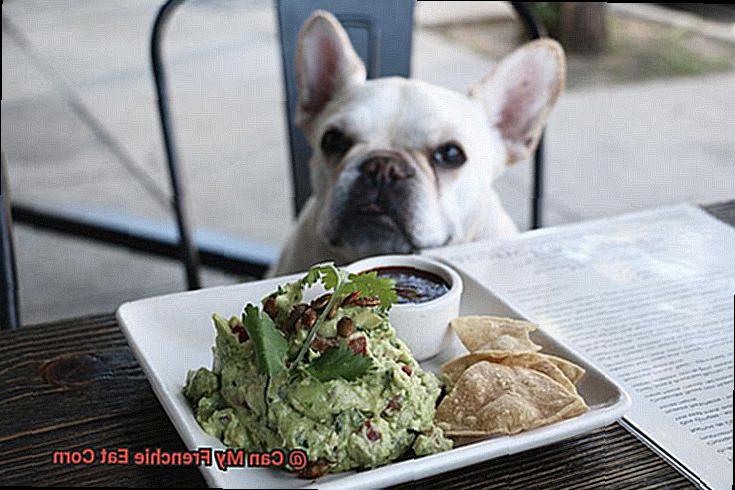
Alternatives to Feeding Your Frenchie Corn
French Bulldogs are beloved companions known for their sensitive stomachs. If you’ve discovered that corn doesn’t sit well with your Frenchie, worry not. There are plenty of alternatives available to provide them with a balanced and nutritious diet. In this guide, we’ll explore various options that are gentle on their stomachs, easy to digest, and packed with essential nutrients.
Choose dog foods formulated for sensitive stomachs or grain-free diets:
Opt for dog foods specifically designed to cater to sensitive stomachs or grain-free diets. These formulas often include alternative sources of carbohydrates, such as sweet potatoes, peas, or lentils. These ingredients are easier to digest for your Frenchie and can help alleviate digestive issues caused by corn.
Incorporate fresh fruits and vegetables:
Fresh fruits and vegetables can add a variety of nutrients to your Frenchie’s diet while being gentle on their stomachs. Some safe options include carrots, peas, green beans, and pumpkin. Ensure that you cook or steam them before feeding them to your Frenchie to enhance digestibility.
Protein-rich alternatives:
Protein is an essential component of a dog’s diet. Opt for lean meats like chicken, turkey, or fish as protein sources. These meats provide easily digestible proteins and essential amino acids that promote muscle growth and overall health in your Frenchie.
Consult with your veterinarian:
Remember that every dog is unique, and individual dietary needs may vary. If you’re unsure about the best alternatives to feed your Frenchie instead of corn, it’s always wise to consult with your veterinarian. They can provide personalized recommendations based on factors like age, weight, activity level, and any specific health concerns your Frenchie may have.
CLxNlf0tju8″ >
Conclusion
In conclusion, it is important to consider the dietary needs of your Frenchie before feeding them corn.
While corn itself is not toxic to dogs, it can be difficult for them to digest due to its high starch content. This can lead to digestive issues such as gas, bloating, and even diarrhea.
Additionally, some Frenchies may have allergies or sensitivities to corn, which can cause further complications. It’s always best to consult with your veterinarian before introducing any new food into your Frenchie’s diet.
They will be able to provide you with personalized advice based on your dog’s specific needs and health conditions.
